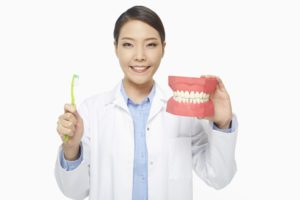 To celebrate the work of dental hygienists and to help raise awareness on the importance of good oral health, the American Dental Association has named October National Dental Hygiene Month. Your oral health can be an indicator of your overall health, so it is important to maintain it. The internet is full of dental hygiene “tips and tricks” about brushing, whitening, flossing, etc. But how do you know what is true and what isn’t? In this blog, we will be investigating these claims and answering some of the most frequent questions with our professional advice to keep your mouth healthy beginning this National Dental Hygiene Month.
To celebrate the work of dental hygienists and to help raise awareness on the importance of good oral health, the American Dental Association has named October National Dental Hygiene Month. Your oral health can be an indicator of your overall health, so it is important to maintain it. The internet is full of dental hygiene “tips and tricks” about brushing, whitening, flossing, etc. But how do you know what is true and what isn’t? In this blog, we will be investigating these claims and answering some of the most frequent questions with our professional advice to keep your mouth healthy beginning this National Dental Hygiene Month.
Can floss picks be used instead of traditional floss?
We all know the importance of flossing (if you do it daily, it could add years to your life!) but if you’re like most people, it is a task you dread or just skip doing. Good news for those that avoid or forget, there’s an innovation in floss called floss picks. A floss pick is a small plastic tool with a curved end that holds a piece of dental floss. The other end of a floss pick features a small plastic pick that can be used instead of a wooden toothpick to remove large food particles that can get caught along the gum line or between the teeth.
Fortunately, this innovation is a good one. Floss picks are not only easier for you but are proven to be just as effective as traditional floss. Whatever your preference, don’t forget to floss once a day!
Is chewing gum really “good” for your dental hygiene?
Yes! Chewing gum has been clinically proven to be good for your dental hygiene. Chewing sugarless gum for 20 minutes following meals can help prevent tooth decay. This is because chewing gum promotes saliva production which has many benefits including: washing away any food debris, neutralizes acids, and spreads disease-fighting substances throughout the mouth.
Does charcoal REALLY whiten your teeth?
The charcoal trend seems to be popular for many uses in the health and beauty world. People even claim charcoal can be used to whiten your teeth. But does it really work?
The answer is no! This is a myth. Charcoal should not be used to whiten your teeth. Although you may not notice any immediate negative effects, the American Dental Association warns users that over time, activated charcoal may wear away the enamel on your teeth. Charcoal may have benefits for your skin when used as a face mask, but we don’t recommend using it on your teeth.
Professional whitening products from your dentist’s office are the safest and most effective whitening products. To learn more about other whitening hacks and our professional services, visit our website.
What is the proper brushing technique?
Brushing for 2 minutes twice a day is the general recommendation but if you’re not brushing correctly, it’s not doing you much good.
To properly brush your teeth, follow this technique:
- Place your toothbrush at a 45-degree angle to the gums
- Gently run the brush back and forth in short strokes
- Brush the outer surfaces, the inner surfaces and the chewing surfaces of the teeth
- To clean the inside surfaces of the front teeth, tilt the brush vertically and make several up-and-down strokes
- Brush your tongue to remove bacteria and keep your breath fresh
Our team at Artistic Dental hopes that you take the time during National Dental Hygiene Month to educate yourself and adopt the necessary habits to improve your oral health. For more information about dental hygiene and other oral health topics, visit our blog or give us a call at (602)840-5400.
